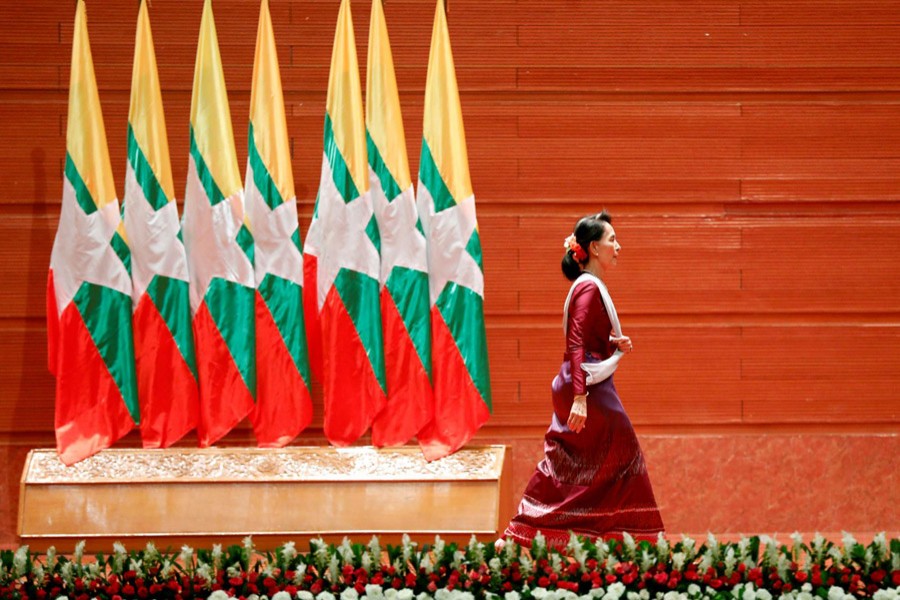The last time Myanmar leader Aung San Suu Kyi travelled to western Europe, she was feted as the freshly elected civilian ruler of a fledgling democracy who had brought an end to half a century of military dictatorship.
When the Nobel peace prize laureate returns next week, her first trip to the region since a 2017 military crackdown on Rohingya Muslims in western Myanmar, it will be to face accusations of genocide, alongside the army she spent much of her life battling.
Gambia, a tiny, mainly Muslim West African state backed by the 57-nation Organisation for Islamic Cooperation (OIC), lodged a lawsuit at the International Court of Justice (ICJ) last month against Myanmar for genocide, including mass murder and rape.
Myanmar denies the allegations, and Suu Kyi’s office said she would fly to The Hague for the first hearings, from December 10, to “defend the national interest”.
“There is a discrepancy between the opinion of Myanmar and the international community,” said Myo Nyunt, the senior spokesman for her National League for Democracy Party. “She has to explain what has really taken place in northern Rakhine.”
Her decision to attend took some by surprise. People close to her with strong international connections voiced concerns it could further tarnish her image abroad, according to two people familiar with the discussions.
But at home the announcement has unleashed a wave of popular support, with the leader who spent 15 years under house arrest for defying the army lauded as once again championing the interests of the people against a common enemy.
Richard Horsey, Myanmar advisor to the International Crisis Group, said while her appearance carried considerable risks for Suu Kyi overseas, “she likely feels that she must do all she can to defend the national interest against what most people in Myanmar see as biased and politically-motivated charges”.
Suu Kyi was still a heroine to many when she last visited western Europe and the United States months after taking office in 2016. Her star faded in office amid sluggish reform and protracted ethnic conflicts, and she faced increasingly harsh criticism from the West as the Rohingya crisis unfolded.
‘No genocide’
An offensive by security forces and local Buddhists in northern Rakhine state in August 2017 drove more than 730,000 Rohingya into neighboring Bangladesh, where they created the world’s largest refugee camp.
United Nations investigators have said the exodus was the result of a military campaign executed with “genocidal intent”.
Myanmar authorities have strongly disputed that conclusion, categorizing the military operation as a legitimate response to attacks by Rohingya militants that killed 13 members of the security forces.
In September 2017, Suu Kyi said terrorists were behind an “iceberg of misinformation” about the violence.
“Myanmar people do not support people being driven from their homes. But it is different with these Bengalis leaving,” spokesman Myo Nyunt said, using a term common in Myanmar but rejected by the Rohingya because it implies they are interlopers from Bangladesh who invented an ethnic identity.
Seven soldiers were jailed for 10 years for killing 10 Rohingya men and boys in the village of Inn Din, but granted early release last November after serving less than a year in prison.
Late last month, the military began a court martial of an unspecified number of soldiers over events in another village, Gu Dar Pyin, the site of an alleged massacre of 10 Rohingya. The military said the soldiers were “weak in following the rules of engagement.” No further details were given about the court martial, which is continuing.
“As far as we know there is Inn Din massacre and Gu Dar Pyin,” said Myo Nyunt. “That’s all... As far as [Suu Kyi] knows, there is no such thing as genocide.”
‘Everything is politics’
Recent weeks in Myanmar have had the flavor of election season, with several pro-Suu Kyi rallies in major cities attended by hundreds of people carrying flags. More are planned for the first day of the hearings.
“Now there are demonstrations across the whole country. This is an attempt to make her image stronger,” said Ko Ko Gyi, a longtime democracy activist and former Suu Kyi ally. “There is a saying – everything is politics.”
Myanmar is due to go to the polls again in 2020 and, while an opinion poll from the People’s Alliance for Credible Elections, an independent group of election monitors, in July showed Suu Kyi retains tremendous support, her government has faced criticism for failing to bring an end to worsening ethnic conflicts in the borderlands or reform the constitution.
Under the charter drafted by the former ruling junta, the military chief nominates a quarter of lawmakers, giving it a veto over constitutional change.
In the southeastern Karen state, regional authorities put up dozens of billboards showing a smiling Suu Kyi flanked by three green-clad soldiers laughing heartily underlined by the words “we stand with you”.


